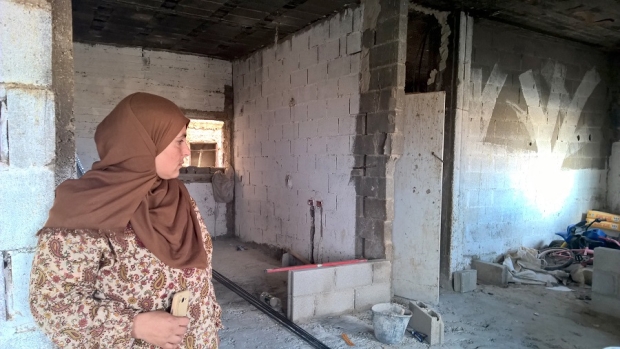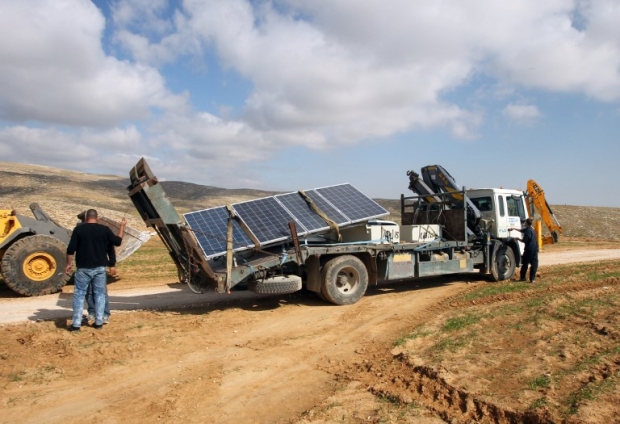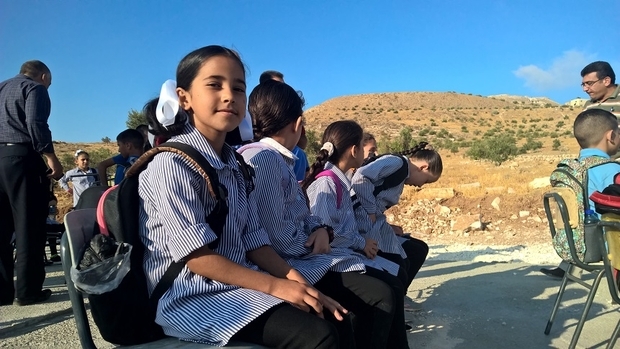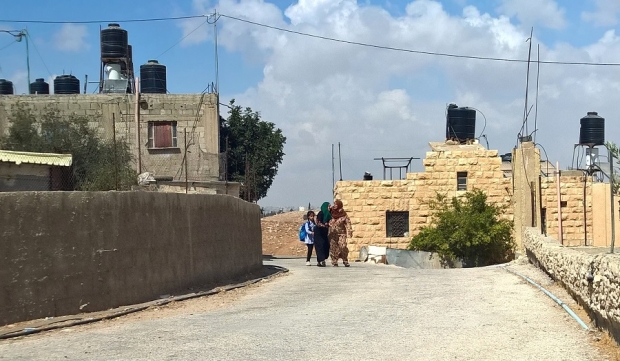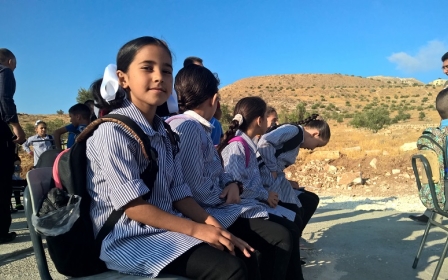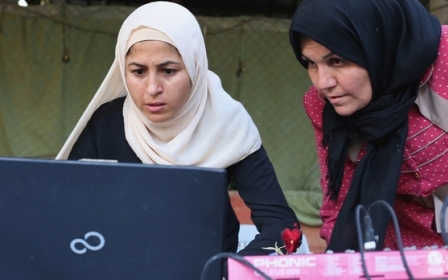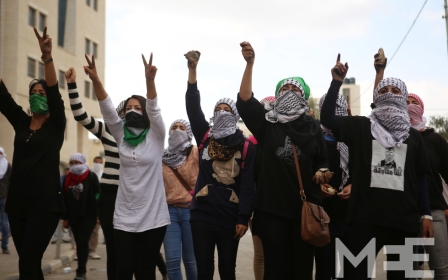Palestinian women’s council takes charge: 'They depend on us'
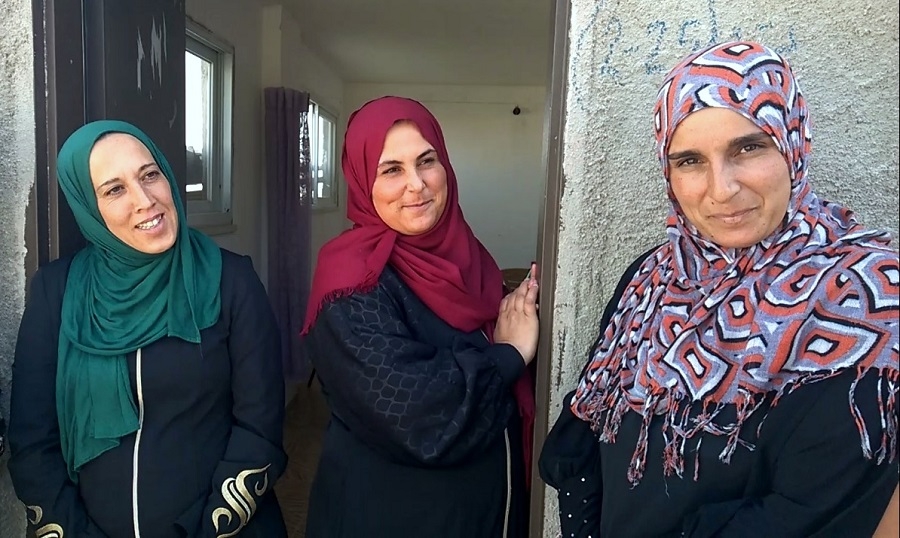
JUBBET AL-DHIB, Occupied West Bank - On the outskirts of the remote Palestinian village of Jubbet al-Dhib, near Bethlehem, the afternoon sun can be seen spanning across the dusty, craggy terrain of the southern occupied West Bank. Fadia, I’tidal and Fatima al-Wahsh are looking on as their children clamber back home in their school uniforms.
The young boys and girls’ return from the nearby al-Tahadi primary school was a reminder of just how far they have come in the span of two years.
In 2015, the situation in Jubbet al-Dhib was dire. The small village, numbering 162 inhabitants, did not have access to electricity; children had to walk almost an hour to go to school, and the nearest grocery store was a three-kilometre walk away.
Due to the difficult living conditions, 22 families left Jubbet al-Dhib in the past decade, I’tidal al-Wahsh told Middle East Eye.
With almost all of the working-age male residents of Jubbet al-Dhib employed inside Israel, mostly in the construction industry, the village is devoid of men during the day.
Fadia, I’tidal, and Fatima were among a handful of women who felt that their only chance at being represented was if they represented themselves.
We know that we hurt those men's egos
- Fadia al-Wahsh, president of women's council
In October 2015, with the encouragement of some local and international NGOs, a women’s council was created in Jubbet al-Dhib, with Fadia al-Wahsh, a housewife and mother of six, as its president.
Despite the significant pushback from men in positions of power in their community, the women managed to turn things around dramatically in the small town.
“We know that we hurt those men's egos, especially the ones who, like the president of the council, are used to heading everything and now look at us from a distance while we lead,” Fadia said, referring to Ratib Abu Diyaa, head of the Beit Ta’mir village council, who also administer Jubbet al-Dhib.
On his part, Abu Diyaa told MEE that the relationship between the women’s council and the Beit Ta’mir municipality was “very, very good,” in contrast with the women’s statements. He did concede that there had been tensions between the two, saying that the women were “acting like a village council themselves”.
Women versus the occupation
“We wanted this organisation to be only for women and for us to lead it as well,” Fadia said. “Because men don't see how we suffer here. They leave early in the morning and come back late at night, while the women have to face all the difficulties.”
While the Palestinian Law on Local Council Elections set a 20 percent women's quota in local political bodies, in practice, like in many other countries, they are often marginalised or shut out from real decision-making positions.
Men don't see how we suffer here. They leave early in the morning and come back late at night
- Fadia al-Wahsh, president of women's council
Women barely won 19.8 percent of seats in municipal elections held in the West Bank earlier this year, and only three women were elected mayors across the Palestinian territory’s 326 municipalities.
Before the creation of Jubbet al-Dhib’s women’s council, its seven founding members had no experience in how to run an organisation. Yet in the span of only two years, the women have been able to make groundbreaking achievements. A Palestinian activist described it to MEE as “unprecedented,” despite the abundance of women’s organisations in the occupied Palestinian territory.
In addition to repairing wells and bringing a grocery store and a tailor to the village, the women’s council was instrumental in getting NGOs to fund and install solar panels in Jubbet al-Dhib in 2016, providing an invaluable source of electricity for the village.
In the beginning, men used to ask us where our husbands were
- Fadia al-Wahsh, president of women's council
Similarly, a school was built 20 minutes away from the village at the behest of the women’s council. They were concerned about their children’s difficult commute to obtain an education. The children can face anything from hot temperatures under the sun, to heavy rain or stray dogs, or at times Israeli soldiers and settlers.
It was demolished by the Israeli army in August the night before the first day of classes, only to be rebuilt overnight by activists in September and called al-Tahadi, which means “challenge” in Arabic.
“When soldiers come and confiscate any equipment, my children ask me why didn’t I stop them,” she said. “They think I'm Abu Mazen (Palestinian President Mahmoud Abbas) and can make all their dreams come true.”
We don’t do anything against our religion, tradition and culture; what we are doing is just claiming our own rights as women
- Fatima al-Wahsh, member of women's council
Most recently, the women have set their sights on installing a clinic that would host a general practitioner as well as a gynaecologist, both health necessities for the village.
In late September, however, the Israeli army confiscated construction material intended to renovate the building designated to host the clinic, also holding a number of foreign volunteers for several hours, the women told MEE, showing photographs taken during the incident.
The project has since remained in hiatus, although I’tidal said that a large-scale international organisation was involved in turning the clinic into a reality.
Since the women began their work two years ago, they say that the Israeli army has not only stymied projects they initiated, but they have also applied intimidation tactics against the members of the women’s council, leading them to fear for their well-being and that of their families.
“There's an element of fear that was never felt before we founded the organisation,” she said. “My husband told me the other day that the work we do will end up causing the revocation of the work permits of the men of Jubbet al-Dhib in Israel.”
According to Fadia, Amor, a private security guard from Nokdim - a nearby settlement where Israeli Defence Minister Avigdor Lieberman resides – told the women’s council that they need to ask permission before taking any action.
“Amor said that we are a threat to the security of the settlements,” Fadia said. “He once told us: ‘If you need or want anything, you have to ask me for permission first'."
“We know we aren’t breaking the law in any way and this is why we shouldn’t be scared at all. We aren't doing anything wrong, but we also know that the Israelis don’t care about this.”
On her part, Fatima argued that the village is peaceful and the residents don't demonstrate against the Israelis or cause any problems for them.
“Maybe they are scared that people here will become active and start to react [against the Israeli occupation]," Fatima said.
For women
Despite the friction, attitudes towards the women have slowly been changing in Jubbet al-Dhib and beyond.
“Many people spoke badly about us, and many men refused to allow their wives to participate in our events and become members of our organisation,” Fadia said. “But people in the village support us now. They aren’t just proud of us, they depend on us.”
Many people spoke badly about us
- Fadia al-Wahsh, president of women's council
Fatima mentioned with pride that she had been told women from other villages saw them as models. “We feel that we are a good and positive example of how to change the situation in our village and in villages around us,” she said.
Through their council, now 25 members strong, the women of Jubbet al-Dhib have found a real sense of empowerment, beyond tokenism or apolitical economic projects often bolstered by foreign NGOs.
“We don’t do anything against our religion, tradition and culture; what we are doing is just claiming our own rights as women,” Fatima emphasised. “We want to prove [to] them that we can do what they can do, that we are equals in terms of our roles in society.”
“Our work here isn’t just for our children, our men, and our community - it is also for women, it's for us,” I’tidal said.
New MEE newsletter: Jerusalem Dispatch
Sign up to get the latest insights and analysis on Israel-Palestine, alongside Turkey Unpacked and other MEE newsletters
Middle East Eye delivers independent and unrivalled coverage and analysis of the Middle East, North Africa and beyond. To learn more about republishing this content and the associated fees, please fill out this form. More about MEE can be found here.


